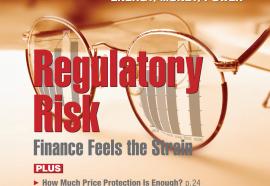Messing With Texas
Armed with calls for gas price transparency, FERC takes aim at intrastate pipelines—the long-forgotten and largely private preserve of the Lone Star State.
Federal Energy Regulatory Commission (FERC) has proposed to bring a modicum of federal oversight to the nation’s intrastate natural-gas pipelines. Given the historical structure and regulation of the nation’s natural-gas industry, it should come as no surprise that FERC’s proposal has polarized the industry in general and the state of Texas in particular.





